Tiling a Polyiamond at Scale 2 with Two Hexiamonds
A hexiamond is a figure made of six equilateral triangles joined
edge to edge.
There are 12 such figures, not distinguishing reflections and rotations.
They were first enumerated and studied by T. H. O'Beirne.

Here I study the problem of arranging copies of two hexiamonds
to form some polyiamond that has been scaled up by a factor of 2.

See also
This table shows the smallest total number of copies
of two hexiamonds known to be
able to tile some polyiamond enlarged by a scale factor of 2,
using at least one copy of each hexiamond.
The blue indexes are links to tilings by the specified hexiamond alone.
| A | E | F | H | I | L | O | P | S | U | V | X |
|---|
| A | *
| 4
| 2
| 8
| 4
| 4
| 16
| 4
| 12
| 4
| 4
| 12
|
|---|
| E | 4
| *
| 8
| ?
| 12
| 8
| 4
| 8
| 24
| 8
| 8
| ?
|
|---|
| F | 2
| 8
| *
| 6
| 4
| 4
| 10
| 4
| 12
| 6
| 4
| 8
|
|---|
| H | 8
| ?
| 6
| *
| 8
| 8
| 12
| 6
| ?
| 4
| 4
| ?
|
|---|
| I | 4
| 12
| 4
| 8
| *
| 4
| 12
| 4
| 12
| 8
| 4
| 8
|
|---|
| L | 4
| 8
| 4
| 8
| 4
| *
| 4
| 4
| 8
| 4
| 4
| 8
|
|---|
| O | 16
| 4
| 10
| 12
| 12
| 4
| *
| 6
| ?
| ?
| 4
| 12
|
|---|
| P | 4
| 8
| 4
| 6
| 4
| 4
| 6
| *
| 6
| 6
| 2
| 6
|
|---|
| S | 12
| 24
| 12
| ?
| 12
| 8
| ?
| 6
| *
| 12
| 8
| ?
|
|---|
| U | 4
| 8
| 6
| 4
| 8
| 4
| ?
| 6
| 12
| *
| 8
| 8
|
|---|
| V | 4
| 8
| 4
| 4
| 4
| 4
| 4
| 2
| 8
| 8
| *
| 4
|
|---|
| X | 12
| ?
| 8
| ?
| 8
| 8
| 12
| 6
| ?
| 8
| 4
| *
|
|---|
So far as I know, these solutions
use as few tiles as possible. They are not necessarily uniquely minimal.
2 Tiles

4 Tiles
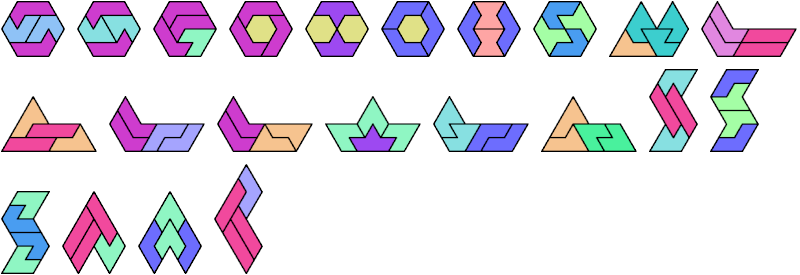
6 Tiles

8 Tiles
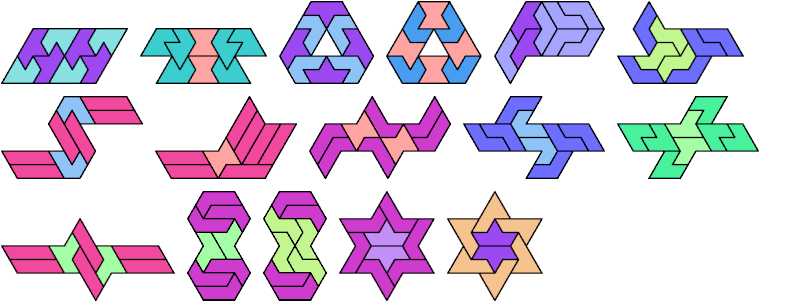
10 Tiles
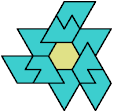
12 Tiles

16 Tiles
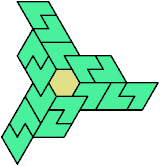
24 Tiles
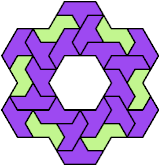

Last revised 2025-05-03.
Back to Polyiamond and Polyming Tiling
<
Polyform Tiling
<
Polyform Curiosities
Col. George Sicherman
[ HOME
| MAIL
]











